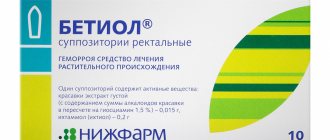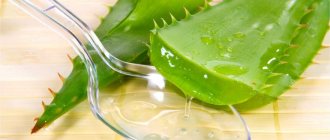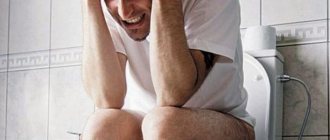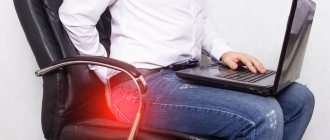All articles
Postpartum hemorrhoids
14.09.2017
Hemorrhoids often develop during pregnancy and even more often occur after childbirth. According to research, about 35 percent of women who have recently given birth experience its symptoms.
With hemorrhoids, the vessels that are located in the anal canal at the exit from the rectum become inflamed and swollen. Signs of the disease include rectal bleeding, pain and itching, prolapse of hemorrhoids from the anal canal and involuntary soiling of underwear.
If you notice bleeding or the pain increases significantly, be sure to consult a doctor to clarify the diagnosis and receive the correct treatment.
The most important risk factor for hemorrhoids is constipation.
Moreover, hard stools worsen the symptoms of the disease. Therefore, soft and regular stools are needed both for the prevention and treatment of hemorrhoids (as well as anal fissures). To do this, doctors advise:
There are foods that contain a lot of fiber (dietary fiber)
Vegetables and fruits, legumes and whole grain flour products are suitable. For example, prunes, apples, bran bread, boiled lentils. The recommended amount of fiber is 20-35 grams per day. Product packaging often indicates how much fiber it contains.
Drink enough water
Focus on thirst, since there are no exact recommendations, but according to rough estimates, men should drink about 3.7 liters of fluid per day, and women - about 2.7 liters. We are talking about any liquid. Juice, coffee and tea also count, as does the water contained in food.
Be active
Do suitable exercises, such as swimming or yoga.
There are several other ways to cope with the symptoms of hemorrhoids without seeing a doctor:
- Use damp toilet paper and then gently blot with a dry cloth (do not rub) to relieve pain. You can simply wet plain paper or use a hygienic shower or bidet.
- Take a warm bath without soap, foam or other additives for 10-15 minutes two to three times a day. Baths improve blood circulation and relax the muscles of the anus.
- Apply cold compresses. To do this, soak a piece of clean cloth in ice water, wring it out and apply it to the sore spot.
- Do Kegel exercises. They should help with involuntary soiling of laundry.
During pregnancy and breastfeeding, the use of any medications (including vitamins and dietary supplements) should be discussed with your doctor.
Content
- Inflammation of hemorrhoids
- External hemorrhoids in women after childbirth
- Postpartum hemorrhoids - causes and symptoms
- Effective treatment
- Is it possible to treat hemorrhoids after childbirth at home?
- What to do if you have inflammation of hemorrhoids during pregnancy and after?
I recently published on the website medklinik.by and in my telegram channel “Doctor Treats” an article “Pregnancy and hemorrhoids: new approaches to treatment.” The article provides detailed recommendations from a proctologist for women planning a pregnancy. These recommendations are based on many years of practice and have benefited many of my patients.
Inflammation of hemorrhoids during pregnancy and after childbirth
But what should a young mother do if hemorrhoids appeared during pregnancy and became inflamed after childbirth?
If you, my dear readers, have read the article “Pregnancy and hemorrhoids: new approaches to treatment,” then you already know why hemorrhoids occur and progress during pregnancy. For those who did not have time to read the article or forgot, I will explain. The pregnancy hormone progesterone relaxes the uterus so that pregnancy can develop. Simultaneously with the uterus, progesterone relaxes the veins, intestines, and ligaments. Under the influence of this hormone and the growing uterus, hemorrhoidal veins expand and hemorrhoids appear.
In this case, external hemorrhoids most often form and, less often, internal hemorrhoids.
Analogs
Analogs of Levomekol ointment have a bactericidal and healing effect. But the difference lies in the active ingredient of the drug. So, among the analogues one can name Fugentin, Levosin (additionally has an analgesic effect), Protegentin, Fastin-1, Salicylic-zinc paste.
Synonyms, that is, drugs with the same substance (but in higher concentration) as Levomekol ointment, can be considered Netran and Levomethyl. Substitute medications can only be prescribed by the attending physician.
Postpartum hemorrhoids are almost always external hemorrhoids
Many of my patients at the appointment additionally note that they themselves did not give birth, but had a Caesarean section. My dears, the process of childbirth itself does not play any role in the development of hemorrhoidal disease (recently, a woman was seen after two Caesareans - 4.5 and 1.5 years ago with quite large inflamed hemorrhoids)! Hemorrhoids grow during the 9 months of pregnancy due to high levels of progesterone and a large uterus in the second half of pregnancy, compressing the pelvic veins.
During childbirth, existing hemorrhoids “just” become inflamed and worsen due to stress.
Please remember this:
- Hemorrhoids appear and grow during pregnancy.
- During childbirth, hemorrhoids become inflamed.
This is precisely why a Caesarean section will not get rid of hemorrhoids, but it can get rid of its inflammation. Although not necessary.
Contraindications
Like many drugs, Levomekol has contraindications:
- individual intolerance to the components of the medication;
- hypersensitivity of the body;
- fungal infections of the epidermis;
- tendency to allergic reactions;
- psoriasis.
The official instructions for use indicate that in pediatrics the ointment is prescribed starting from 3 years of age. However, many pediatricians, based on the harmlessness of Levomekol, allow its use from infancy.
Causes and symptoms
So, we agreed: hemorrhoids appear during pregnancy. Alas, it remains with you in later life if it is not removed.
Why is that? External hemorrhoids behave like varicose veins in the legs. Very often these diseases occur together during pregnancy. Or progress if they were there before. Therefore, just as varicose veins will not go away after childbirth, so hemorrhoids will also remain with you. And just as varicose veins will progress and cause problems, so hemorrhoids will increase and bother you.
Have you noticed an extra fold in your anus after giving birth? This is an external hemorrhoid with a 90% probability.
Is the fold gradually enlarging or new ones appearing? These hemorrhoids are growing.
The fold hasn't changed yet? This does not mean that hemorrhoids have disappeared or are not progressing: while the nodes are not large, their bulk is located deeper, in the anal canal. Can you check for hemorrhoids yourself? Yes, immediately after defecation, preferably without getting up from the toilet, wash your butt and touch it with your fingers. You can strain quite a bit. Soft tissue is identified under the fingers, and when you press on it, it decreases. This is the external hemorrhoid.
In such a situation, there is nothing I can do to please you. Go to a proctologist. The smaller the node, the easier it is to remove it with a laser.
Use of Levomekol ointment in gynecology
Levomekol is successfully used in gynecology and urology.
In gynecology, therapy is carried out using tampons with ointment applied to them. A similar method is indicated for the treatment of the following conditions:
- inflammatory erosion of the cervix;
- inflammation of the uterine appendages (ovaries, fallopian tubes);
- divergence of vaginal sutures after ruptures during childbirth or operations.
The treatment system consists of the following sequence of actions:
- before use, a woman must thoroughly wash and dry the skin of the treatment area and perineum;
- if therapy is used after the divergence of vaginal sutures or after operations, then the sutures must be treated with a weak solution of potassium permanganate or furatsilin;
- you need to make a small cotton swab, put an ointment on top of it measuring 15 mm x 15 mm, and 5 mm high;
- insert into the vagina at night and remove in the morning;
- if therapy is used after the divergence of vaginal sutures or after operations, then the ointment is applied to a gauze bandage and applied to the sutures. Then put on clean underwear (if necessary, you can additionally use a pad). The dressing remains on for 2 to 6 hours.
Using the method described above, the active substance of the ointment is delivered to the affected area and absorbed into the surrounding vaginal tissue.
In urology, Levomekol is used in the treatment of balanitis and balanoposthitis in men, as it has anti-inflammatory and antimicrobial effects. The treatment system consists of the following sequence of actions:
- before applying the ointment, the head of the penis is washed with a weak solution of potassium permanganate or furatsilin, removing pus and dead tissue;
- Levomekol is applied to the affected area in a dense layer.
The remedy is applied 1-2 times a day until complete recovery. After the inflammation is relieved, Levomekol is applied for another week, 1 time per day - in the evening, before bedtime.
Treatment of postpartum hemorrhoids
Laser coagulation of hemorrhoids is well tolerated, is performed on an outpatient basis and does not require giving up breastfeeding .
Let's look at a few more situations that are very common after childbirth.
During childbirth, hemorrhoids became inflamed, and then the inflammation went away and nothing bothers me. There was only a small fold of skin left in the butt. A common situation. There are hemorrhoids, but they are small and there are no clinical manifestations of the disease now.
There are two options for the development of the situation that most often occur.
- As the child grows up, the load increases and the hemorrhoids begin to become inflamed or bleed. If there is dense feces, a tendency to constipation, then problems appear earlier and bother you more often. Medicines don't help much. This option occurs in about a third of patients. They are contacted earlier, most often before a year and a half from childbirth, hemorrhoids are usually small or medium-sized, and respond well to treatment. Treatment results are most often good or excellent.
- There are external hemorrhoids, they progress slowly, gradually, and do not bother me much. Medicines initially relieve exacerbations well. But gradually exacerbations occur more often, more severely, medications stop helping, and the situation forces you to see a doctor.
In both situations, the later you contact a proctologist, the more difficult it is to improve the health of your butt. This is understandable: the larger the hemorrhoids, the more problems, the larger the operation needed to correct the problem. And the more extensive the operation, the more traumatic it is and the less likely it is that the butt will fully recover to its pre-illness state.
What you won’t see in the prime! Years, 3-5-10 years of meaningless treatment often lead to monstrous hemorrhoids. Sometimes inpatient surgery does not help to cope with such hemorrhoids.
Does it happen that after childbirth there are no hemorrhoids? It happens, of course. I am currently treating a young mother who gave birth 4 months ago. She doesn't have hemorrhoids. I also saw one patient after three births without hemorrhoids. And about 15 - 20 patients after two births without hemorrhoids. But this comes from many years of practice. Of course, with healthy veins after the first birth, not everyone has hemorrhoids, but more than half definitely have it.
Laxatives
A laxative during breastfeeding is necessary to provide immediate assistance to yourself. However, some remedies help normalize intestinal function in general. To understand the mechanism of their work, consider all groups of laxatives:
- stimulating;
- volumetric;
- osmotic;
- softening.
The first act on intestinal receptors. They are addictive and can cause complications such as lazy bowel syndrome. In addition, taking stimulant laxatives is not allowed during lactation, so the doctor will not recommend using drugs from this group.
Osmotic drugs do not pass into breast milk and are not addictive. They are often prescribed to nursing mothers. However, a significant part of such drugs are used in coloproctology and gastroenterology as a measure of preparation for endoscopic diagnostic methods, surgical interventions, etc. They reliably cleanse the intestines, but have a pronounced effect - they can cause frequent loose stools.
Softening agents are oils, glycerin, etc. They help soften stool and simplify their movement through the intestines. However, such drugs are not approved for continuous use, since they impair the absorption of fat-soluble vitamins. This can be fraught with the development of hypovitaminosis for a young mother.
Bulk laxatives are represented by herbal or synthetic-based drugs. They act similarly to natural fiber - they are not digested in the intestines, absorb water and swell, increasing the volume of intestinal contents and softening the stool. In addition, such drugs gently stimulate intestinal motility, causing defecation. The components of such products do not pass into breast milk. They are allowed for nursing mothers and can be taken for a long time.
One such remedy is the British drug Fitomucil Norm. It contains psyllium seed hull and plum fruit extract - natural soluble and insoluble fiber. The drug gently stimulates bowel movements and promotes regular bowel function.
Is treating hemorrhoids after childbirth effective at home?
Unfortunately, women suffer from hemorrhoids. They are treated periodically using venotonics, various suppositories and ointments, and sometimes laxatives are added. And when conservative treatment completely stops helping, exacerbations become too strong and frequent, they come to the appointment and ask for a miracle to be performed.
A miracle means complete relief from hemorrhoidal problems. It is desirable, as an additional bonus, to receive an aesthetically attractive anus; and so that later you don’t have to use medications, at least periodically.
My dears, miracles in treatment happen only in the initial stages of the development of any disease, before changes have yet occurred in the organ itself and surrounding tissues. In relation to the anus - as long as the disease has not changed or significantly changed the anatomical structure of the anus.
Side effects
Levomekol is considered a universal drug and is usually well tolerated by patients. But in case of overdose (if the drug is used for more than a week), allergic skin reactions may occur.
- hyperemia;
- burning;
- itching;
- urticaria;
- dermatitis at the site of application;
- local swelling;
- When using vaginal tampons, candidiasis may occur.
No incompatibility with other medicinal products has been reported. Make sure that the ointment does not get into your eyes, mucous membranes or inside. In case of contact with eyes and mucous membranes, rinse them immediately with running water. If swallowed, the stomach must be rinsed.









